Divya Deshmukh becomes third Women’s World Cup Champion, defeats Humpy Koneru in tiebreak
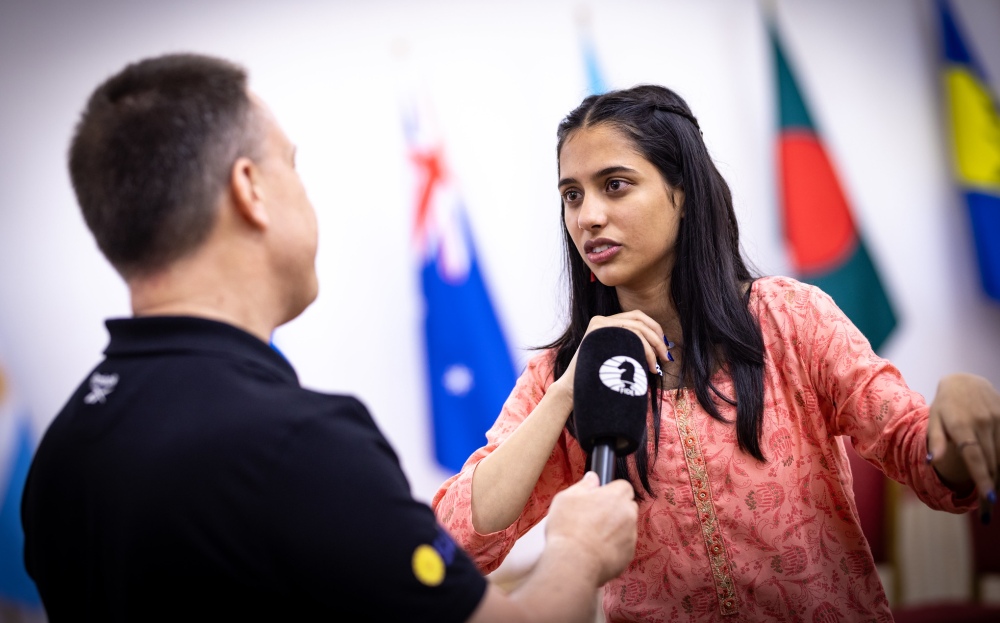
Divya Deshmukh, the 19-year-old International Master from Nagpur, Maharashtra, etched her name into chess history by defeating Grandmaster Humpy Koneru 1.5–0.5 in the tiebreaks to win the Women’s World Cup. She now follows in the footsteps of GM Alexandra Kosteniuk (2021) and GM Aleksandra Goryachkina (2023) as the third-ever winner of this prestigious title. In the two 15+10 rapid tiebreak games, Divya showed both resilience and composure. After missing a golden opportunity in the first game, which ended in a draw, she brought elite-level precision to the second. There, she equalised comfortably as Black, then seized control as Humpy slipped under time pressure—clinching the crown in emphatic fashion. With this remarkable win, Divya Deshmukh is now not only the 2025 Women’s World Cup Champion, but also one of the most exciting young stars in the world of chess. After the final game, an emotional Divya embraced her mother before giving a short interview: “It’s hard for me to speak now. Of course, this definitely means a lot, but there is a lot more to achieve, so I am hoping that this is just the start,” she said. https://www.youtube.com/watch?v=gEYitGH_RtI With this triumph, Divya not only secures the USD 50,000 first prize, but also automatically earns the Grandmaster (GM) title—the highest title in chess. In doing so, she becomes one of the very few players in history to achieve it by winning a major FIDE event rather than collecting the usual three GM norms and 2500 rating. Reflecting on this, Divya shared: “I still need time to process it. I think it was fate, me getting the Grandmaster title this way, because before this I didn’t even have one norm, and now I’m a Grandmaster.” Divya also qualifies for the 2026 Candidates Tournament, alongside the second and third-place finishers— GM Humpy Koneru and former Women’s World Champion Tan Zhongyi. A full prize-giving report with photographs is scheduled for later this evening. Up next: A closer look at today’s dramatic tiebreak games. Tiebreak Game 1: A missed opportunity FIDE President Arkady Dvorkovich was on hand to greet both finalists before the round, wishing them the best of luck in the decisive tiebreak. At exactly 12:00, the chief arbiter started the clocks for the first of two 15+10 rapid games. Divya opened with 1.e4, and in a surprise deviation from her usual 2…Nc6 systems, Humpy Koneru opted for the Petroff Defence (2…Nf6)—a line she had largely set aside in favor of the ultra-solid Berlin since late 2023. Humpy had played the Petroff extensively after becoming a Grandmaster in 2002, and she returned to it today with a very specific sub-variation in mind. On move 6, she chose 6…Bf5, a reliable and less theoretical side-line she had previously used to defeat Divya in the Tata Steel India Blitz 2023. This system gives White dynamic play in exchange for an isolated queen’s pawn (IQP), while Black aims to reach slightly better endgames by neutralizing the activity. Up until move 15, the players followed a well-known game between Leon Luke Mendonca and Arseniy Nesterov from the 2024 Biel Masters, which ended in a draw. At this point, Divya made a principled and bold decision: she played 20.d5, aiming to liquidate the IQP and open lines for her active minor pieces. Humpy responded instantly with 20…Rad8!, targeting the newly weakened center. In the ensuing tactical sequence, Humpy won the d5-pawn, but White had just enough piece activity to maintain dynamic equality. Then came the blunder. With the clock ticking down to her final 20 seconds, Humpy played 33…Re7, overlooking a tactical shot. Divya immediately responded with 34.Rd1!, threatening to trade rooks and win the bishop on g6 after 34…Qb8, due to the pin and pressure. The only defense was for Humpy to sacrifice her queen, entering a materially imbalanced but defensible endgame: rook, bishop, and pawn vs. queen. Despite the material imbalance, Humpy built a fortress, Divya had a chance to break through on move 37, but missed this opportunity and the game ended in a draw. Instead of 37.Rc8?, trading the rooks Divya should have played 37.Qb8+, picking up the a7-pawn. The point is that the natural 37…Kh7 fails to 38.Rc8! followed by 39.Rh8+ winning. “A big missed chance for Divya,” remarked former five-time World Champion Viswanathan Anand, who joined the official broadcast with expert commentary and praised both players for their fighting spirit. Tiebreak Game 2: Nerves, risk—and triumph With the score tied after the first rapid game, the pressure was at its peak as Humpy Koneru opened the second game with the Catalan Opening. In response, Divya Deshmukh chose the aggressive 4…dxc4, 5…Bb4+ variation—an ambitious and increasingly popular system at the top level, favored by elite Grandmasters like Dmitry Andreikin, Grigoriy Oparin, and Parham Maghsoodloo. In this line, Black accepts a pawn sacrifice, giving White a lead in development and long-term pressure on the dark squares. However, modern theory has shown that if Black times the pawn return correctly, the position can often simplify into a defensible or even equal endgame. “This opening does give you a chance to counterattack,” said Vishy Anand during the live broadcast, “but Divya will have to play passively for a few moves, which is not really her style.” Despite the slight passivity, Divya held on to the extra pawn heading into the middlegame, though at the cost of weaknesses on a5 and c6. Her pieces were slightly cramped, but the position remained balanced according to engines. Humpy’s major problem, however, was time. While Divya had over 11 minutes, Humpy was already under three. For the next 20+ moves, the players circled each other with careful maneuvers, but made little concrete progress. A draw looked imminent. And then came the turning point. With less than a minute left on her clock, Humpy suddenly played 40.e4?!, a central break that shocked commentators. After 40…dxe4, she immediately followed up with 41.d5?, a blunder that allowed Divya to strike with 41…Qe5!, seizing control. “A totally self-inflicted collapse by Humpy,” said Anand. “There
FIDE Women’s World Cup Final, Game 2: Elite-level precision as Humpy and Divya head to tiebreaks
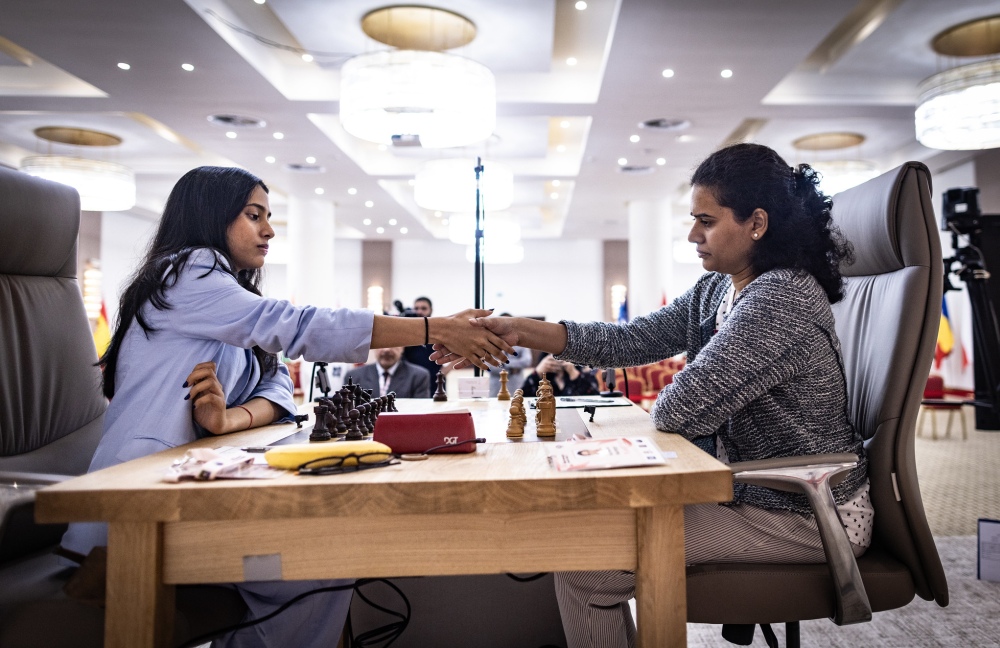
Tan Zhongyi clinches third place and candidates spot in a thrilling battle against Lei Tingjie The second game of the Women’s World Cup final ended in a solid draw. Humpy Koneru attempted to unbalance an equal position with an enterprising pawn sacrifice, but Divya Deshmukh defended accurately, and the game was drawn after 34 moves. “It should have been an easy draw, but I got into trouble for no reason,” Divya remarked candidly after the game. With both classical games drawn, the title will now be decided in tomorrow’s rapid tiebreaks. Humpy, the reigning World Rapid Champion, enters the playoff with strong credentials, but Divya has shown remarkable composure and resilience in previous tiebreaks, having already defeated Grandmasters Zhu Jiner and Harika Dronavalli in earlier rounds. “I think I’m going to give my best tomorrow,” said Divya. “She is of course a very strong player, but I’m hoping things go my way.” In the battle for third place, Tan Zhongyi emerged victorious against fellow Chinese Grandmaster Lei Tingjie. In an exciting encounter, Tan capitalized on a major blunder by Lei in the late stages of the game. With the win, she not only claimed the bronze medal but also secured a coveted spot in the Candidates Tournament. Tan, a former Women’s World Champion, has now achieved an impressive record in the three editions of the Women’s World Cup: two third-place finishes and one fourth place. Elite-level Precision as Humpy and Divya head to tiebreaks The second classical game of the Women’s World Cup final between Humpy Koneru and Divya Deshmukh was a showcase of top-tier accuracy. Both players recorded a remarkable 99% accuracy score, with an average centipawn loss of just three—a clear testament to the elite level of play on display. Humpy surprised with the fashionable Zukertort setup: 1.Nf3 2.e3 3.c4—a line used by players like Levon Aronian and gaining popularity in recent years. Though not a staple in Humpy’s repertoire, she had previously used it to score a notable win over IM Salome Melia at the 2024 New York Rapid & Blitz, where she clinched the World Rapid Championship title. As expected, Divya’s preparation was impeccable. With a series of precise moves, she comfortably neutralized White’s initiative and steered the game into a balanced queen and minor piece endgame. The position was dynamically balanced—Humpy had the bishop pair, but the closed center allowed Divya’s knights to hold their ground. After a lengthy think, Divya played 21…Ne4, a principled and engine-approved choice that invited complications. Humpy immediately seized the opportunity to transform the position with 22.Bxe4 dxe4 23.d5!, sacrificing a pawn to open the long diagonal and activate her bishop. Though down a pawn, White seized the initiative. Divya found herself under sudden pressure and explained afterward: “I got myself into a mess for no reason. I was trying to see if there was a win, but I missed Qb8.” That moment came on move 26: Despite being a pawn ahead, Black was caught in a bind. The knight on d8 was pinned and vulnerable, and mating threats loomed. Divya, showing great defensive prowess, played Kh7, eventually freeing herself with a precise …Nc6 maneuver. Though she had to return her extra pawn, the simplification allowed her to force a perpetual check, bringing the game to a balanced conclusion. With both classical games drawn, the final will now be decided in rapid and blitz tiebreaks tomorrow. According to an unofficial FIDE poll of 10,000 viewers, the odds are almost evenly split: 52% favor Divya, while 48% lean toward Humpy. The outcome now hinges entirely on their speed chess prowess and nerves under pressure. https://youtu.be/6Xj8N1NLW9Q Tan Zhongyi clinches third place and Candidates spot in thrilling battle Against Lei Tingjie In the other decisive match of the day, Tan Zhongyi overcame Lei Tingjie to secure the bronze medal and, crucially, the final qualifying spot in the 2026 Candidates Tournament, which determines the challenger for the Women’s World Championship. Lei opened with the Giuoco Pianissimo, a quiet but deeply theoretical variation of the Italian Opening—a line she had already employed multiple times during her semi-final clash with Humpy Koneru. Tan, well-prepared for the encounter, followed familiar territory from her Round 5 victory over Vaishali, but in this game, she allowed Lei the opportunity to pin the knight on g5 early after castling. “I actually didn’t expect her to play this opening. I had prepared this before when I played against Vaishali, and back then I made a mistake in the move order, but I reviewed it again, and I didn’t expect that she would play it today. I feel pretty lucky,” Tan confessed in a quick postgame interview. The first critical moment arose just out of the opening: This position has appeared in several top-level games, with players like Aronian and Vidit choosing the creative 12.Ra3!?, sacrificing the d4 pawn in exchange for swift rook activity. Instead, Lei introduced a novel idea: 12.Bb5!?. After 12…exd4 13.Nc4! dxc3 14.Nxb6!, the game took a sharp tactical turn: If Black greedily continues with 14…cxb2, White responds with 15.Bxb2 cxb6 16.Ra3!, followed by 17.Nh2 and 18.Rg3, setting up a devastating kingside assault in exchange for two pawns. Recognizing the danger, Tan wisely declined the material and prioritized piece activity and king safety with 14…cxb6. From that point on, both players followed the engine’s top line with astonishing precision, showcasing exceptional preparation and decision-making under pressure. The second pivotal moment occurred in the late middlegame: Here, Tan had a winning opportunity with 35…Qf1!, pinning the g2 pawn and threatening both mate and the rook on d4. However, spotting the correct follow-up—36.Rxe6 h5!—was far from easy. This subtle pawn move shuts down any escape via g4, and with …Qh1# looming, White would have been helpless. Tan missed the win, and Lei managed to regain balance with two pawns and a knight for the rook, entering a complex endgame. However, with the clock ticking down, Lei made a fatal error in a tense position: Here, 52.Kg3 would have prolonged
FIDE celebrates 5.5 million moves and announces prize winners for Social Chess Day Tournament
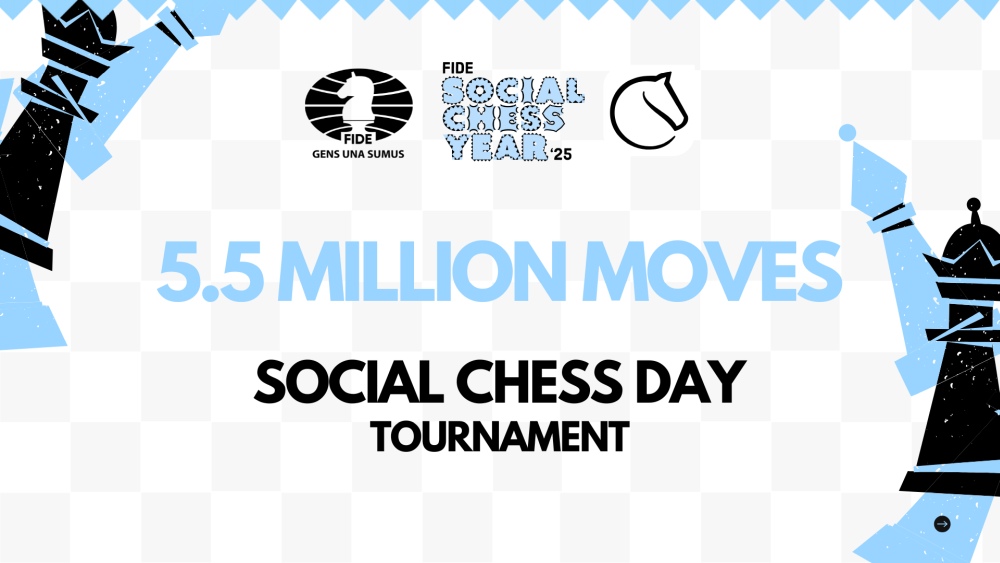
To mark International Chess Day 2025, FIDE and Lichess.org hosted a 24-hour global online blitz tournament as an open celebration of chess as a universal language. The response was overwhelming. More than 20,000 players joined the event, making it one of the largest social chess tournaments ever held. In total, 20,078 players took part, playing 85,252 games and making over 5.5 million moves. The format was a 5+3 blitz, and players could join at any time throughout the 24-hour period, making the event truly global and inclusive. This initiative was part of FIDE’s broader campaign for the Year of Social Chess, under the theme “Every Move Counts.” In keeping with that spirit, the event focused not on elite competition, but on connection, creativity, and community. As part of the celebration, hundreds of participants were randomly selected to receive prizes ranging from Olympiad invitations to training sessions with Grandmasters. UPD. Due to an incorrect file of prize draw participants initially provided by the platform, the first prize selection was carried out among those who were not eligible to participate in it. Once the error was identified and FIDE obtained a corrected file of prize draw participants, we have conducted a prize redraw in full compliance with the regulations. Attending the 2026 FIDE Chess Olympiad in Samarkand Five lucky participants have been awarded invitations to attend the opening ceremony and first round of the 2026 FIDE Chess Olympiad in Samarkand, including two nights of accommodation: Yatharth9680071234 legendaandivan Barinjaka Andrii_Nikolenko GalimovaTS FIDE Merchandise Vouchers Ten participants won €100 vouchers to spend on official FIDE merchandise: Denis2909 Dnyanesh1303 Timila CCY-OFICIALL-ACC666 avtarsingh86 CalebtalleyALT mahmod07777 XAJIK Jagma_is_baak ejderha35 “Chess Players” Photography Books Twenty participants will receive a copy of the “Chess Players” photography book, a visual celebration of the game and its people: adzag MihailSandykov Serg80 baazbahadur HENKBATSBEK Jae_Ftg Darkstar108 Thiago_BRC mashariki_1 Turaarrr Mehmet_Tirane Krishnay13 HiradShahbazi88 CBA4006IMANFAHIM TLTLTLTLTLT AaryanKov Ptahotep denizefe34 Mandalorian99 xilefkerl Online Experiences with Grandmasters 1-on-1 Training with GM Lei Tingjie ALITA20 Motivational Talk with GM Nijat AbasovFifty participants were invited to a group session led by GM Abasov. The winners are: No55gaming Diamantesco SMKN30 vincents82 Michele_11 Darrennswana ysxy512 IvanKaramazov123 Brilliant_Machine NareshDusa williebob Cybernautilus poxay Blue_Commander Godspower16 VincFrancisco_Bacoor dumDudum Favian_2889 fjcufujfhxhzd Cvillarino22 dimitris1 Eidan1803 MZM10 Ahimalya_2025 Spitzwegerich_1 lolomezzo A-prox-mate MungiwaraNoGoofy Leilin2004 B342 fcvomond NoahCizdziel CARLA8787 Mikhail_P Lotta14 uditbkp123 magnussen0 daydreamerfun AluDilu pietrek_c DIgor1706 Kollagogom2 abhinavsreejith2012 Threee_Move_Wonder maniatul Zhendosik_sigma theonlywayusmate27 Bart1815 Yurij291212 shivanshwins Online Simultaneous Exhibitions with GrandmastersThe following participants were selected to play in online simuls with some of the world’s top players: With GM Humpy KoneruPs1803, Prihaan_porwal, Inumaki_toge, SayeedHazim, THUNDER_1102, JagaranA1, jens_g, Alejandritok7vell, Patzekatze, tryandprepme With GM Praggnanandhaalipson4u, Asia_1345, franmaco, DenisNov, pipopopi, akpap, elmagnificocolcho, Grandmaster-sammy, hareramj, pratsfares With GM Vaishali Rameshbabukamilen777, MEAT17, Aathvik, franciscocodoceo, DanPoki, Pepsiboyvaca, Sweetlake, Sashka228, diuberjesus14, hisforhenry With GM Tan ZhongyiCATF41, frankfreith, kashalot138, Sameer-AlSayed-2010, bhootbangla, ManqayiVuyo, Mohsen_Dj, LEZGIN-05, mukyducky, marcochess2021 With GM Arjun Erigaisihetman1968, s_titan1388, Ankalk, Legend1001, RY6973, WMANIMSARA, marranin, Sanubcg, Boldoo1, pra777 With GM Valentina Gunina (with lecture)amitgond, Ultra_Instinct2008, DrPurgerstein-2008, Terellel, RL1122, mathbro, NikTash, Magnusthelegendary, Sigma_001, EKAMDSINGH9 With GM Anish GiriJohnHiggins98, brauberg25, TowelaKaira, akm133, MathiasSanchez_UDEP, alexlamoc, easy_Win_lol, AbardomVladimir dmare, The_god_of_chess_001 With WGM Anna Shukhman (with lecture)Xaviersuper, Kavishrc, Rumochka_master, Herzatimer, Gauravviiii, Basher-Ghazal, sianbeaz, Vombrabro, Cxb451, migs423 Game Analysis and Q&A with GM Anna Muzychuk Twenty participants earned the opportunity to take part in a game review and Q&A session with GM Anna Muzychuk: amirreza_g7 AkiroOnFire sussasun Raghavsingh2426 brnvstrncyagmur avjd thaihung1532015 JuwanJJK eduardillo Thesonucguy KokulskiAleksei Bobbyschrodinger rathodtushar iHaidi92 flash_9110 AlexStargazer ThatAdam mamzouj yoooi romanbier This event was not about titles or final standings, but about participation and connection. It demonstrated that chess can unite people from every corner of the world. To everyone who joined the tournament: thank you. Every move counts. And every one of you helped make it count on July 20.
List of teams qualified for 2nd FIDE Chess Olympiad for People with Disabilities
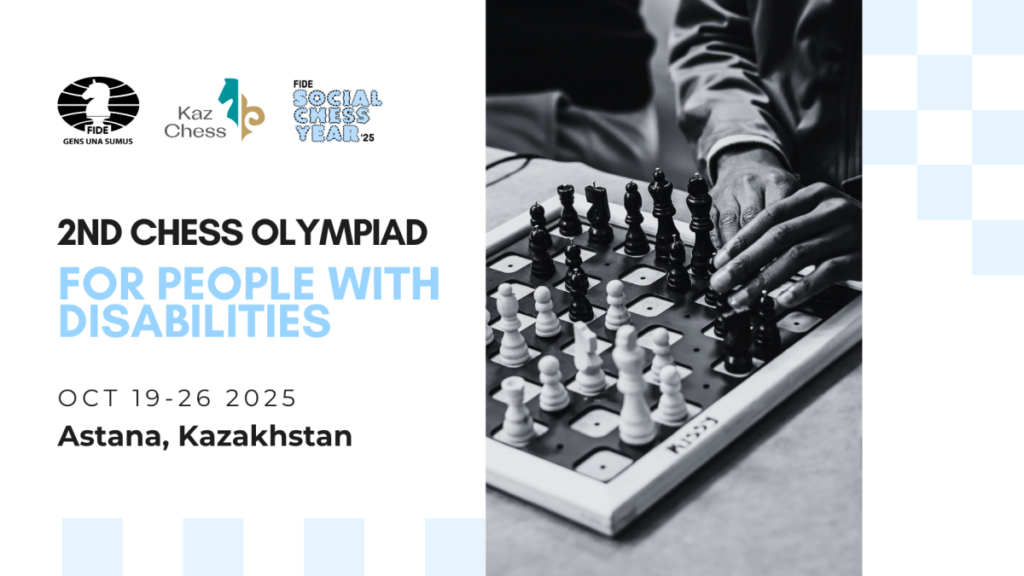
The 2nd Chess Olympiad for People with Disabilities will take place from October 19 to 26, 2025, in Astana, Kazakhstan. Organized by FIDE and hosted by the Kazakhstan Chess Federation, this major international event highlights FIDE’s ongoing commitment to inclusion and accessibility in the global chess community. The Olympiad will bring together up to 34 teams from across the world, composed of players with visual, hearing, and physical impairments. Each team will consist of four players (with at least one from each gender), one captain/reserve, and one accompanying person. The competition will be held at the Paralympic Training Centre in Astana, a venue specially adapted to accommodate the needs of all participants. So far, 32 teams have qualified for the event, with two teams to be nominated by the FIDE President. Continental qualification Europe – 9 teams Poland Hungary Israel Ukraine Germany Croatia Czech Republic North Macedonia Serbia Asia – 7 teams FIDE Philippines India Iran Bangladesh Myanmar Uzbekistan Americas – 6 teams Cuba Venezuela Argentina Colombia USA Chile Africa – 5 teams Egypt Zambia Zimbabwe Tunisia Uganda Teams from the FIDE affiliated organizations – International Associations of Players with Disabilities – 3 teams International Braille Chess Association (IBCA) International Chess Committee of the Deaf (ICCD) International Physically Disabled Chess Association (IPCA) Nominations of the FIDE President – 2 teams TBD TBD Teams from the hosting federation – 2 teams Kazakhstan 1 Kazakhstan 2 Photo: Mark Livshitz The first edition of the Chess Olympiad for People with Disabilities was held in Belgrade, Serbia, in 2023, marking a historic milestone for accessible chess. The event drew global attention for its inclusive spirit and high-level organization, laying the foundation for a growing tradition. 2nd FIDE Chess Olympiad for People with Disabilities Regulations (PDF) For registration and queries, federations are encouraged to contact: dis@fide.com.
FIDE Women’s World Cup Final, Game 1: Narrow escape for Humpy Koneru; solid start by Divya Deshmukh
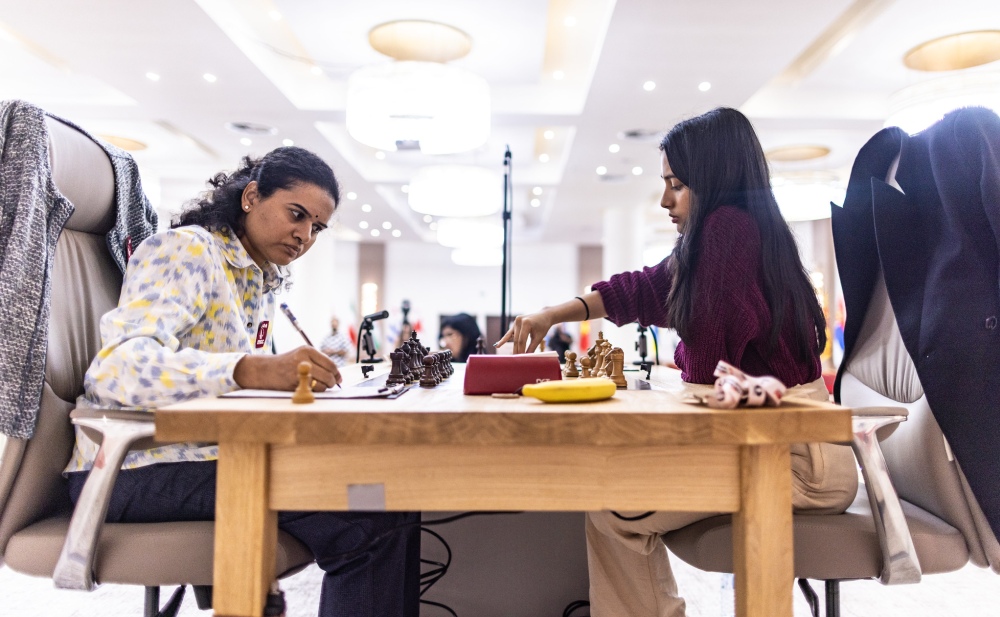
Tan Zhongyi and Lei Tingjie also split the point in a balanced game The first game of the final was as exciting as it gets. Divya unleashed some excellent opening preparation and was on the verge of scoring a win in under 25 moves. However, Humpy defended tenaciously and capitalized on a few inaccuracies to salvage a draw. The second game of the match will be played tomorrow, with Humpy having the white pieces. In her post-game interview, Humpy admitted she had narrowly escaped defeat: “I think she was clearly better after 12.Rb1 instead of 12.Nc4. After that, I’m not sure what was going on, but it was very complicated.” In the third-place match, Tan and Lei split the point just after the 30-move threshold. Lei will have the white pieces in tomorrow’s second game, with the winner securing the final Candidates qualification spot. Let’s take a closer look at the games. Although Divya is comfortable playing both 1.e4 and 1.d4, the former has been her weapon of choice throughout the tournament in Batumi. So, it came as a surprise to see her open today’s game with 1.d4 — and even more so when Humpy Koneru responded with the Queen’s Gambit Declined, a defence she had largely set aside since 2005. Humpy reintroduced the Queen’s Gambit Declined to her repertoire in 2023, but has used it sparingly compared to her other openings. Her most recent outing in this line — a loss to Lei Tingjie in Norway Chess 2024 — followed the variation featured in today’s game. Reflecting on that earlier defeat, Humpy said in her post-game interview: “I think that she prepared on this game and I just misplayed the opening and she got a big advantage.” The first critical moment came very early. According to the database, this position has appeared in about thirty elite-level games — all of which continued with 7.f3, reinforcing the e4 pawn and guarding against 7…Nxe4. But Divya deviated with 7.Be2 — a rare move, though not a novelty. GM Evgeny Bareev had employed it against GM Vassily Ivanchuk back in 1992. Today, engines rank it as their third choice. Humpy spent around ten minutes considering her reply and ultimately declined the pawn with 7…Bb7, possibly wary of running into home preparation. Undeterred, Divya castled and offered the pawn again. This time, Humpy accepted — and suddenly the game became sharply tactical, reminiscent of the original Bareev–Ivanchuk clash more than three decades ago. According to the engine, Divya missed an opportunity to achieve an opening advantage on move twelve but certainly on move fourteen she went wrong. In this critical position, the computer recommends 13…Kd8 for Black. After 14.Qe2 Re8, the position appears dangerous, but with precise play, it remains objectively equal. However, Humpy opted for 13…Kf8?, a natural-looking move that unfortunately gave her opponent a real chance to seize the initiative. “I don’t remember exactly the reasons, but I felt that 13…Kd8 was the wrong move,” Humpy said after the game. Sensing that an opportunity had arisen, Divya went into deep thought but ultimately missed the most punishing continuation. She played 14.Bxb7?, grabbing material but allowing the position to equalize after 14…Qxb7 15.Qe2 Nc6 16.d5, when the excellent defensive resource 16…h5! returns the extra piece and neutralizes White’s initiative. “I felt that after 16…h5 I was out of danger,” Humpy reflected. https://www.youtube.com/watch?v=G28SnnLdqsQ&t=7s Instead of capturing on b7, Divya should have played 14.Qe2!, maintaining a crushing +2.5 advantage according to the engine. The move intensifies the pressure on the exposed Black king and keeps White’s attacking momentum alive. Of course, finding such a precise continuation over the board, especially under time pressure, is never easy. Divya was visibly distressed at the end of the game after missing her chance to secure the win — the disappointment was evident on her face as she sat at the board. Even so, both players graciously spent time with fans who had been waiting all afternoon for a photo opportunity and a chance to meet their chess idols. Although all eyes were focused on the main game of the finals, the battle for third and fourth place was equally significant. The winner would secure the third qualifying spot for the Candidates Tournament, plus a €5,000 pay jump. Both Chinese players, good friends and frequent training partners, brought their best to the board. Tan opened with 1.c4, and the game soon transposed into a well-known position from the Queen’s Gambit Declined, Exchange Variation. Both players blitzed out their moves rapidly, demonstrating excellent theoretical knowledge. Instead of pursuing the mainstream minority attack plan—characterized by 10.Qc2, followed by 11.Rab1 and a later b4-b5—Tan opted for a less common approach with 10.a4. The idea was to play 11.a5, aiming to clamp down on the queenside. Recent games from elite players such as Caruana, Praggnanandhaa, Vidit, and Grischuk seem to support this strategy. The pace slowed as the game transitioned into the middlegame around move fifteen. Both players maneuvered their pieces carefully, seeking out the best squares. Their accuracy remained impeccable—no outright mistakes were made. However, a couple of small inaccuracies by Tan on moves 29 and 30 shifted the balance toward Lei. Though the engine suggests Black holds a modest +1 positional advantage—roughly equivalent to a pawn—the position was blocked, and White’s knights stood powerfully in the centre. Black’s slight edge mainly lay in a better pawn structure. Lei offered a draw just as her clock ticked down to fifteen minutes. In the end, both players left the hall together in good spirits, their friendship evidently undiminished by the fierce contest. Follow the games live and watch the action with expert commentary provided by GM Valeriane Gaprindashvili and IM Almira Skripchenko on the FIDE YouTube channel. Written by IM Michael Rahal (Batumi, Georgia) Photos: Anna Shtourman About the tournament: Scheduled to take place from July 6th to July 28th, the 2025 FIDE Women’s World Cup will gather together in Batumi (Georgia) the world’s best female chess players. A total of
International Organizer Seminar announced as part of World Youth Chess Championship 2025
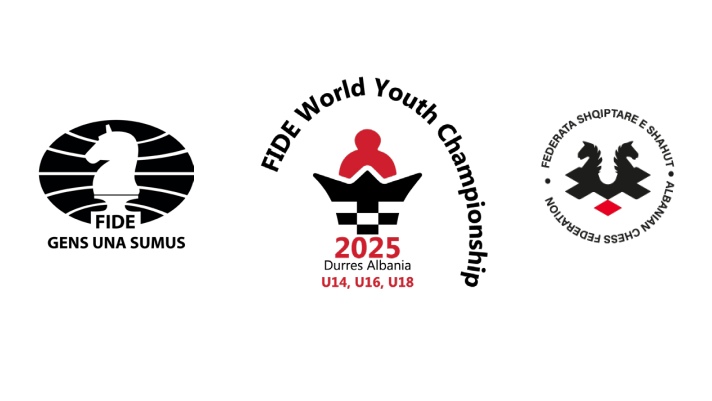
As part of the World Youth Chess Championship 2025 in Durrës, Albania, the Albanian Chess Federation, in cooperation with FIDE WOM and under the auspices of the FIDE Events Commission (EVE), will host the International Organizer Seminar. This seminar is designed to train and certify organizers of international chess events in compliance with FIDE regulations. Participants who successfully pass the final exam will receive the official EVE IO Norm Certificate, issued by FIDE. Seminar details Dates: October 11–12, 2025Location: Grand Blue FAFA Resort Hotels, Durrës, AlbaniaLanguage of instruction: EnglishParticipants: Maximum 20Participation fee: 100 Euros Schedule Saturday, October 11Session 1: 10:00 – 13:00 (CET +1)Session 2: 14:00 – 16:30 (CET +1)Sunday, October 12Session 1: 10:00 – 13:00 (CET +1)Session 2: 14:00 – 15:30 (CET +1)Final Exam: 15:30 – 16:30 (CET +1) Seminar topics FIDE Events Commission Regulations (mission, structure, competition regulations, bid procedure) FIDE Title Regulations FIDE Rating Regulations How to Organize Chess Tournaments Fair Play Guidelines FIDE LecturerOzgur Solakoglu (TUR) – IO, IA, FT, FM Assistant LecturerAnastasia Sorokina (AUS) – IO, IA, FPE, FT, WIM Special Participation offer for womenAs part of the FIDE WOM event, the first 10 registered female participants will receive free participation. Additionally, the Albanian Chess Federation has the right to nominate 2 participants free of charge. Registration & contact: nadzeya.krauchuk@gmail.com Parallel events like cultural visits, chess events and seminars, will be announced in due time.
FIDE Women’s World Cup Round 6: Humpy clinches victory in thrilling tiebreak
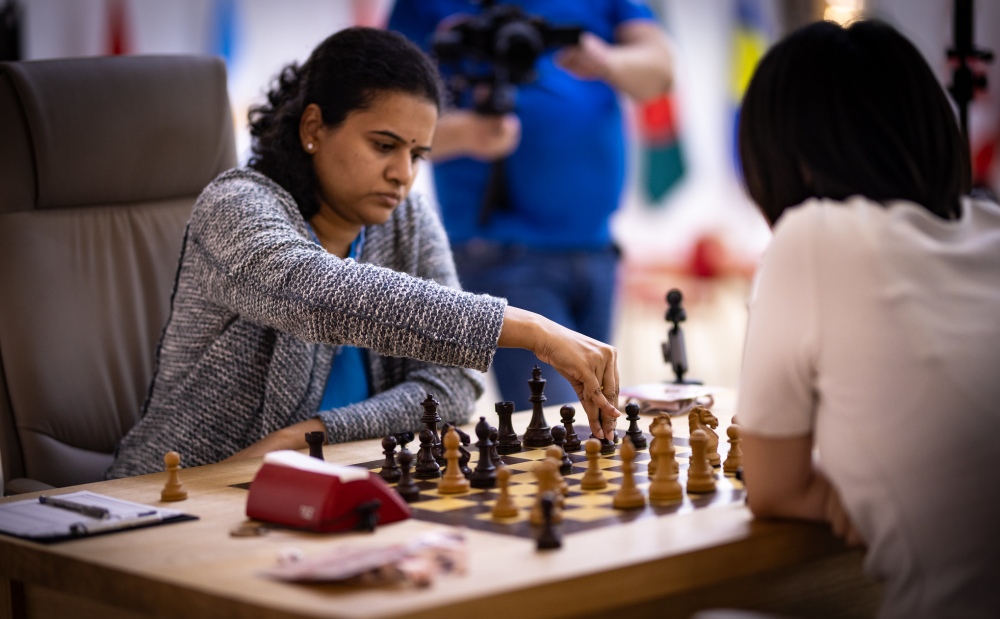
After tomorrow’s rest day, Humpy will face off Divya in the final Something extraordinary is happening in Indian chess — and the world is starting to take notice. India has taken the global chess stage by storm in 2024, delivering one historic moment after another. First came the unprecedented double triumph at the Budapest Olympiad, where India clinched gold in both the Open and Women’s sections. Then, Gukesh D, the teenage sensation from Tamil Nadu, became the World Chess Champion, etching his name in history as the youngest undisputed champion in the modern era. And now, in a development that underscores the country’s growing stature in women’s chess, India have two players in the final of the Women’s World Cup — a first in the event’s history. On one side is the prodigious Divya Deshmukh, just 19 years old, who stunned former Women’s World Champion Tan Zhongyi with a clinical 1.5–0.5 victory in the classical games. On the other is the ever-reliable Humpy Koneru, India’s top female player for nearly two decades, who booked her place in the final this afternoon after a thrilling six-game tiebreak victory over Lei Tingjie at the Batumi Grand Bellagio. If 2024 is any indication, Indian chess isn’t just rising — it’s redefining the global chess landscape. It took six fiercely contested games for Humpy Koneru to secure her place in the final, edging past Lei Tingjie with a final score of 5–3. The match, marked by tense moments and momentum shifts, showcased both players’ resilience and rapid skills under pressure. The contest began with two 15+10 rapid games, both ending in draws. Lei missed a clear winning opportunity in the first game, and Humpy later acknowledged her slow start: “It was a very tough match. Initially, I played quite badly with the Black pieces and she always had the advantage.” The breakthrough came in the 10+10 rapid section, where Lei struck first with a win in Game 3. But Humpy responded with steely determination, leveling the score in Game 4: “After the loss, it was a very difficult situation, but I was able to come back.” Heading into the 5+3 blitz tiebreaks with everything on the line, Humpy displayed her composure and tactical sharpness, winning both games in time scrambles to seal the match. https://www.youtube.com/watch?v=K_85695yDcg Reflecting on the battle, Humpy was gracious in victory: “I played a bit shaky in the rapid, but she also gave a very good fight. It could have gone either way.” Looking ahead to the final, Humpy highlighted the significance of an all-Indian clash against Divya Deshmukh: “I think it’s one of the happiest moments for chess fans because now the title will go to India for sure. But of course, as a player, tomorrow will be quite a tough game as well—Divya has played tremendously well in this whole tournament.” As Humpy advances to the final, her performance not only underlines her enduring class but also marks a proud milestone for Indian chess. Let’s take a closer look at some of the key moments of the match. In the opening encounter of the 15 + 10 rapid tiebreak, Humpy narrowly escaped a dangerous position. Lei Tingjie missed a golden chance to seize a decisive advantage with the intuitive sacrifice 19.Bxh6! gxh6 20.Qd2, initiating an unstoppable kingside attack. Despite spending nearly a minute evaluating the idea, Lei likely abandoned the line due to the lack of an immediately forced win — a common practical decision under time pressure. Humpy survived the scare, and the game eventually ended peacefully. Though the second game concluded in a solid draw, it was clear that Humpy held the upper hand throughout. Lei finally broke through in the third rapid game, now at a 10 + 10 time control. In an already slightly worse position due to weak light squares, Humpy blundered with 22…h5?, allowing the powerful response 23.Bc4!, simultaneously threatening the rook on e6 and the vulnerable f7 pawn. After 23…Rb6 24.gxh5+ Nxh5 25.Nxh5 Kxh5 26.Bxf7+ White emerged a clean pawn up. Humpy mounted a determined defence, but Lei converted her material advantage flawlessly to clinch the win. After this game, Lei was seen taking a short break in the lobby, quietly refocusing for what could be the decisive fourth rapid game. The fourth 10 + 10 rapid game was all Humpy, but even at the end she had to be careful. Humpy found the accurate 38.Qc7! forcing resignation, side-stepping the trap 38.fxe3? Qe4!, and it’s Lei who can force at least a perpetual check, if not more. After this comeback, the vibe in the room was that Humpy was on a roll, while Lei might have been slightly discouraged. Even so, both 5+3 blitz games were tremendously exciting and ultimately decided by tactics. The following moment in the fifth basically gave Humpy the key to the final. Black has to be very careful here – the extra pawn isn’t worth as much as the tactics on the seventh and eighth rank. With just a few seconds on her clock, Lei blundered with 44…Ra6?, and after 45.Qd7! hitting f7, 45…Qf8 46.Rc8, she lost her queen and the game. Instead, the correct move order was 44…Qf8! followed by 45…Ra8, and it should be a draw. Written by IM Michael Rahal (Batumi, Georgia) Photos: Anna Shtourman About the tournament: Scheduled to take place from July 6th to July 28th, the 2025 FIDE Women’s World Cup will gather together in Batumi (Georgia) the world’s best female chess players. A total of 107 players from 46 different federations are set to participate in the event, including seventeen of the current top twenty! Chess legends, seasoned professionals and emerging talents will play for the $50,000 first prize, in addition to three qualifying spots for the Candidates. The full pairings tree and day-by-day results can be found on the Women’s World Cup website.
FIDE World Youth Championships 2025: Registration deadline approaching

FIDE and the Albanian Chess Federation invite all national chess federations to participate in the 2025 FIDE World Youth Chess Championships (U14, U16, and U18). The competitions will be held in Durrës, Albania, from October 3 (arrival) to October 16 (departure). Each national federation may register one official player in each category (Under 14, Under 16, and Under 18, Open and Girls). This totals six official players plus one accompanying person (with a valid FIDE ID) per federation, all of whom are invited by the organizers. Additionally, players who finished 1st–3rd in the 2024 World Youth Championships (U14, U16, U18), as well as the gold medalists of the most recent Continental Youth Championships, earn the personal right to participate in the corresponding or a higher age category. Registration deadline: August 2, 2025. Invitation letter and regulations (PDF) FIDE World Youth Chess Championships 2025 official website: worldyouth2025.fide.com E-mail: worldyouth@fide.com
Alexandr Predke wins Serbia Open 2025
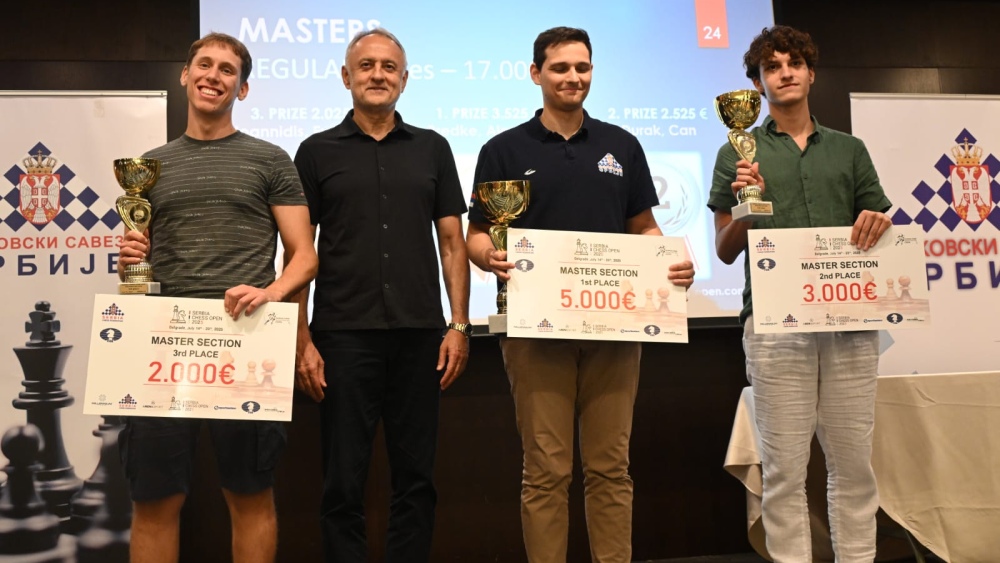
Serbian grandmaster Alexandr Predke emerged as the winner of the 5th International Summer Chess Festival Serbia Open 2025, edging out six players on tiebreak. The top seed lived up to expectations as a pre-tournament favorite and came out on top, despite losing five rating points along the way. A true chess spectacle, the 5th International Summer Chess Festival Serbia Open 2025 was held from July 14–23 at the “Metropol Palace” hotel in Belgrade. The event brought together over 500 players from 42 countries. The festival followed Swiss system format and featured tournaments in three categories: Masters (9 rounds), Challengers, and Amateurs (7 rounds). As anticipated, the Masters event proved to be intensely competitive, with the final round ultimately deciding the winner. One of the tournament’s biggest surprises was the impressive performance of 14th seed IM Can Durak from Turkey, who took the lead in Round 5—though his reign at the top was short-lived. Heading into the final round, five players shared the lead with 6.5/8 points, including eventual champion Predke. The key games between Ioannidis Evgenis vs. Alexandr Predke, and Can Durak vs. Evgeny Postny (Israel), ended in draws. Meanwhile, Suresh Harsh (India), Bojan Maksimovic (Bosnia and Herzegovina), and Khuyagtsogt Itgelt (Mongolia) scored crucial wins to join the leaders. In the end, seven players finished with 7/9 points, with Alexandr Predke taking the title thanks to superior tiebreaks. He edged out Can Durak, who finished second, by just half a point on the Buchholz tiebreak. Ioannidis Evgenis completed the podium in third place. Serbia Open 2025 Masters – Final standings On the final day, a closing ceremony was held to award trophies and prizes to the top performers. Tournament Director Vladimir Sakotić opened the ceremony by thanking the Chess Federation of Serbia and its president, Andrija Jorgić, for enabling him to be part of an event that has grown into a regional chess highlight. “I want to thank the Chess Federation of Serbia and President Andrija Jorgic for allowing me this year to be part of the story that has grown into a regional chess event of the highest importance. This is what the response of the participants and the growth in the number of participants in each of the individual tournaments tell us, and compared to last year it is a total increase of over 300 participants or an almost unreal 1758 participants in 12 tournaments,” said Sakotic. He also presented trophies to the top performers in the veterans’ category: Milan Andrijevic, Kostić Branimir, and Duško Zmijanac. SCF President Andrija Jorgić awarded prizes to the top female players: Li Xueyi (China), Arpita Mukherjee (India), and Serbia’s national champion, Sofia Pogorelskikh. In his remarks, Jorgić expressed his gratitude to the Ministry of Sports and everyone involved in organizing the prestigious event. “Chess is definitely a game that brings people together, like bridges, we were like a bridge between east and west. In the Ivo Andrić hall of the “Metropol” hotel, we had Ukrainians, Russians, Azerbaijanis, Armenians, Iranians, and Israelis. Everyone was playing chess and giving each other a hand. And I am especially proud that 30 percent o f the participants were women, while the world and Serbian average is only 10 percent,” Jorgić pointed out. Finally, Minister of Sports Zoran Gajić presented trophies and symbolic checks to the top three finishers: Alexandr Predke (€5,000), Can Durak (€3,000), and Ioannidis Evgenis (€2,000). Minister Gajić officially declared the festival closed, sharing his hope that the players would return home with fond memories of Belgrade. “I want everyone who is here to feel like winners, because everyone who participates in sports is partly a winner. Congratulations to the Chess Federation of Serbia, which is one of the oldest, most traditional, and strongest associations with extensive experience in organizing competitions. The history of Serbian chess is great and I want you to organize more tournaments like this next year, and I invite all the participants of this tournament to accept the invitation and come to this festival next year as well,” he concluded. Photos: Serbia Chess Open 2025 Official website: serbiachessopen.com/index.php/en/
FIDE Women’s World Cup R06 Game 2: Divya Deshmukh makes history by defeating former Women’s World Champion to reach final
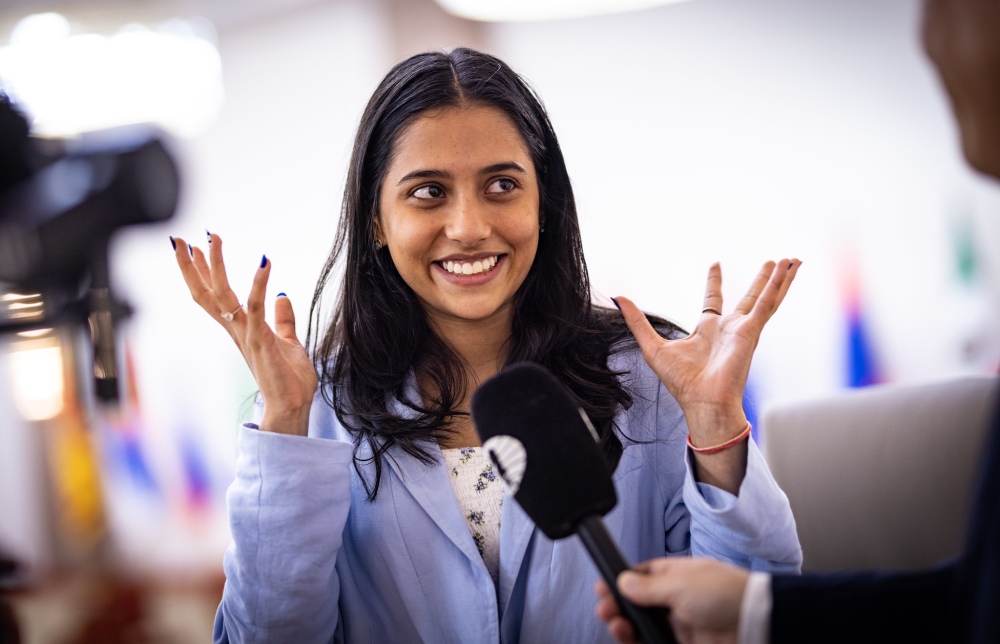
Lei Tingjie and Humpy Koneru will tiebreak tomorrow In one of the most thrilling afternoons of chess in recent memory, India’s rising star, IM Divya Deshmukh, delivered a stunning upset by defeating former Women’s World Champion, GM Tan Zhongyi of China, to advance to the final of the FIDE Women’s World Cup. The 19-year-old from Nagpur made history as the first Indian woman to reach the final of this prestigious tournament. With this landmark achievement, Divya also secures one of three highly sought-after spots in the FIDE Women’s Candidates Tournament, bringing her within striking distance of a world title challenge. In addition, her performance earns her a Grandmaster norm, a major milestone on the path to the sport’s highest title. Still absorbing the momentous result, Divya reflected candidly in her post-game remarks on stage: “I think I could have played much better. I was winning at a certain point and then it got complicated. I think I messed up in the middlegame and that I should have had a much smoother win.” As she now prepares for the final, all eyes are on Divya Deshmukh, whose fearless play and quiet determination have already secured her a place in chess history. In the other hard-fought semi-final encounter, Indian GM Humpy Koneru maintained sustained pressure throughout the game, never allowing her opponent, GM Lei Tingjie, an easy path to equality. “Today’s game was very tough, and I think at some point she could have won,” Lei admitted in her post-game interview, acknowledging the uphill battle she faced. Despite being on the defensive for much of the game, Lei showed remarkable resilience and accuracy, with only one critical moment near the end where she stood on the verge of defeat. In the end, the draw was a hard-earned and well-deserved result. “Tournaments are like this—very up and down. At this point, you just have to fight for every game,” Lei concluded, reflecting the gritty determination required at this elite level of competition. Let’s take a closer look at the two games. Humpy Koneru vs Lei Tingjie (0.5-0.5) A special guest of the event, Mr. Armaz Chagalidze, Representative of the Ministry of Sport of Georgia, had the honor of making the first move on Humpy’s board. With a 5.5–4.5 head-to-head lead in Humpy’s favor, expectations were high for a tight and tense encounter — and the players did not disappoint. Humpy opened with 1.d4, to which Lei responded with the Slav Defence. Interestingly, although the Exchange Variation is not Humpy’s typical weapon of choice, she recently used it successfully against IM Nurgyul Salimova at the Pune Grand Prix. On the other side of the board, Lei has a long-standing history in the line, with games dating back to 2013 and continuing through 2024. The first key psychological moment occurred on move seventeen. Humpy paused to consider her options. A clear path to a draw existed via the repetition line: 17.Bb5 Rfc8 18.Ba6, which would have almost certainly led to a threefold repetition and a quick handshake. Instead, showing ambition, Humpy opted for 17.f3 e5 18.dxe5 Nxe5 19.Qxd7 The game transitioned into a complex and unbalanced double rook and pawn ending, with Humpy slightly better. However, Lei demonstrated excellent defensive precision, notably sacrificing a pawn to keep her rook and king active — a practical choice that neutralized White’s advantage. For a long stretch, engines evaluated the position as 0.00 — and the game seemed destined for a draw. And indeed, it was. But not before one final twist. With only one minute on her clock, Humpy missed a golden opportunity: 64.Rd5! This move cuts off the black king, followed up with 65.Kc5, White would have had a winning position. Instead, Humpy played 64.f5+?? Kd6, allowing Lei to set up the well-known Philidor third-rank defense, and from there, she held the draw without difficulty. “I was under pressure most of the game, but I think the endgame should be holdable. Still, it’s hard to defend,” Lei commented after the game. Looking ahead to the tiebreaks, she added calmly: “I’m just happy to play the tiebreaks after today’s game. If I lose, I don’t care. If I win, it will be a kind of gift.” https://youtu.be/YYDgQpz0PfM Divya Deshmukh vs Tan Zhongyi (1-0) The classical head-to-head score between these two competitors favoured Tan Zhongyi 3–1 going into today’s game. Nevertheless, in their previous encounter, the result was adraw—with Divya pressing in the final phase. This game marked a small but significant shift in Divya’s opening repertoire: for the first time in classical chess, she essayed 3.c3 against the Sicilian. Typically known for her preference for the Open Sicilian with 3.d4, the early deviation suggested a specific preparation or a surprise strategy. However, signs of discomfort emerged early on, as she spent considerable time during the opening phase—indicating she was slightly unfamiliar with the nuances of the position. At this moment, Divya played the natural 15.Qxc1, maintaining her lead in development. However, this was a missed opportunity. The engine reveals a much stronger continuation: 15.Qxd8+ Kxd8 (or 15…Bxd8 16.Nd6+) followed by 16.Rac1 Bb7 17.Rfd1+ In this line, White not only wins a pawn but also seizes long-term pressure with dominating rooks on the open files. It would have posed serious practical problems for Tan Zhongyi. By move 23, Divya faced a critical decision: to launch an attacking initiative or go for concrete gains by winning a pawn in exchange for the opponent’s activity. She chose the latter—a path that engines evaluate as suboptimal. This slight misjudgement shifted the momentum, and soon Tan Zhongyi seized the initiative. But the tide was far from settled. In this tense, complex moment, Tan had just under eight minutes remaining and used six of them here, calculating deeply. Unfortunately for her, she chose the wrong continuation. Tan played 32…Bxf3 followed by 33.gxf3 dxe2, allowing White to regain control. Instead, she had a spectacular tactical resource: 32…Rg4! 33.Nxe8 Bxf3! If 34.Nxc7, then comes 34…Rxg2+ 35.Kf1 Rxh2, and White cannot stop the devastating checkmate on h1. This stunning queen sacrifice would have turned the tables completely, and with Divya having only 30 seconds on the clock, it’s unclear whether she could have navigated through the complications. After Black’s missed chance, the game became

